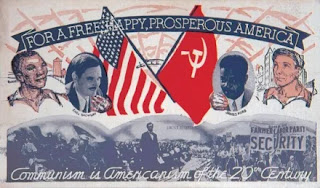Socialism with American Characteristics

By Luke Pickrell and Myra Janis. Originally published in Cosmonaut Magazine . Introduction The Communist Party of the United States (CPUSA) celebrated the 100th anniversary of its founding in 2019 and signs would appear to augur well for the organization in the coming years. Recently, the party discussed running candidates for office. 1 Membership numbers are rising, 2 and the party credits itself and its allies for the “broad front” that defeated Donald Trump in the 2020 presidential election. 3 Having abandoned the Democratic Socialists of America, an organization in a crisis of political direction, and gazed upon the desolate expanse that is revolutionary socialism in the United States, some comrades have turned away from the red rose toward the tried and true hammer, sickle, and gear. Unfortunately, these comrades will not have escaped the politics of class collaborationism by fleeing DSA and may find themselves in even hotter water. The CPUSA marked its centena...

